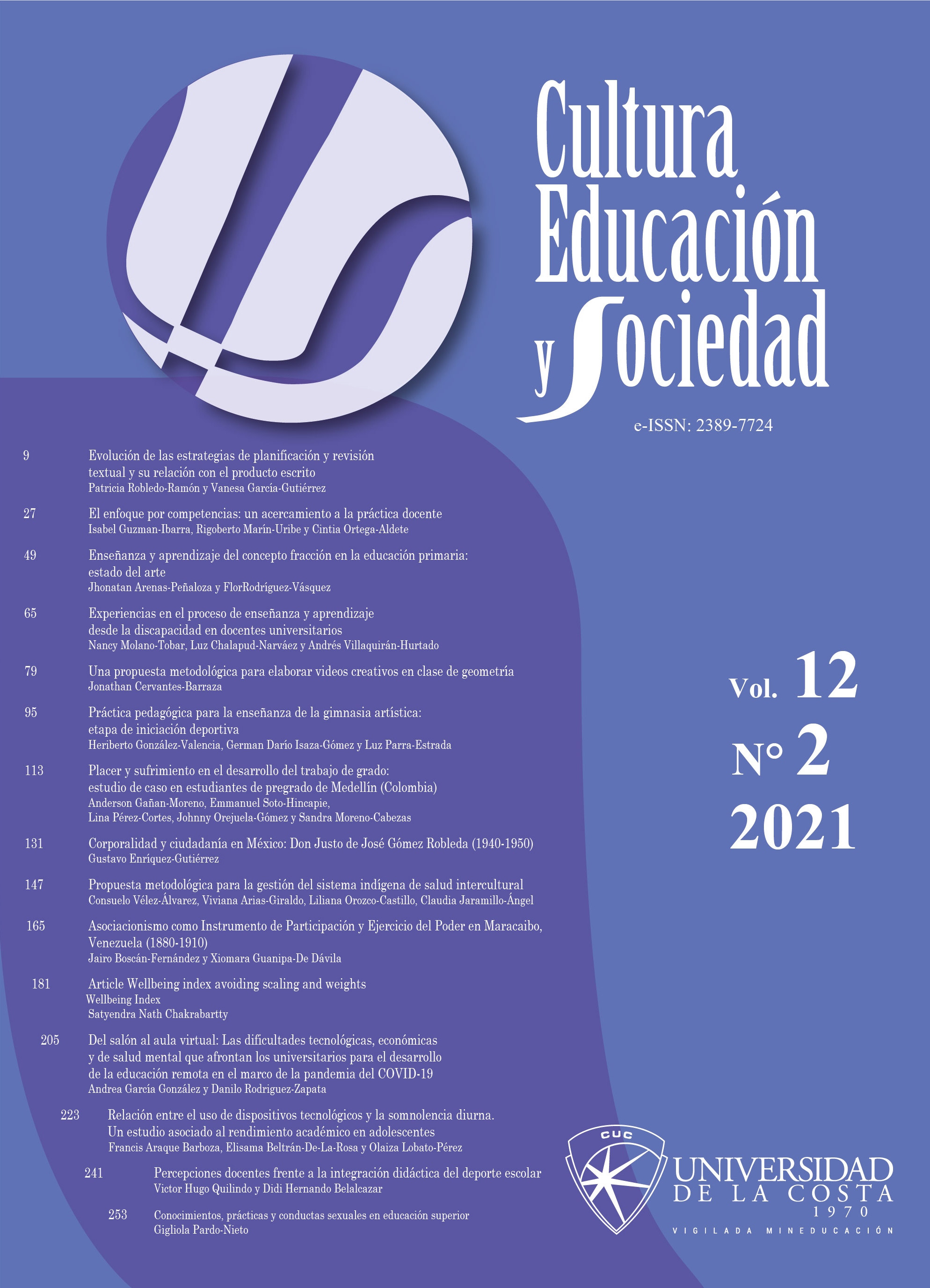Pleasure and suffering in the development of undergraduate work: a case study in undergraduate students from Medellín (Colombia)
DOI:
https://doi.org/10.17981/cultedusoc.12.2.2021.07Keywords:
Pleasure, Suffering, Psychodynamics of work, Graduate work, Undergraduate studentsAbstract
The experiences of pleasure and suffering in the development of undergraduate or thesis work in undergraduate students from the city of Medellín were described. For this, the concepts of pleasure and suffering were taken into account, as well as what are the causes and symptoms of these. Finally, the defense strategies used by students in the face of the suffering acquired by the development of the degree work were referenced. The method used was qualitative with a transversal modality. A semi-structured interview was conducted with six university students, they were transcribed and analyzed using the discourse analysis technique. The results indicate that university students have as main causes of suffering when doing their degree work, the overinformation to which they are subjected and the exacerbated decrease in leisure. On the other hand, the causes of pleasure are recognition for a job well done and solidarity among colleagues. The causes trigger symptoms, these are stress and anxiety. To avoid pathologizing symptoms, students use advocacy strategies such as viewing memes, creating WhatsApp groups, and physical exercise.
Downloads
References
Antloga, C., Mendes, A. y Maia, M. (2012). Placer y sufrimiento en el trabajo: estudio de caso con empleados en la sección administrativa de una empresa de materiales de construcción en el DF. Revista Internacional de Psicología Aplicada, 2(5). 6–32.
Dejours, C. (2009a). El desgaste mental en el trabajo. Madrid: Modus Laborandi.
Dejours, C. (2009b). Trabajo y sufrimiento. Madrid: Modus Laborandi.
Dejours, C. (1999). Conferencias brasileiras: identidade, reconhecimento e transgressão no trabalho. São Paulo: FGV.
Freud, A. (1965). El yo y los mecanismos de defensa. Barcelona: Paidós.
Fernández, C., Baptista, P. y Hernández, R. (2014). Metodología de la investigación. México, D.F.: McGraw-Hill.
López, F. (2002). El análisis del contenido como método de investigación. Revista de educación, 4, 167–180. Recuperado de http://rabida.uhu.es/dspace/bitstream/handle/10272/1912/b15150434.pdf?sequence1
Melo, A. y Orejuela, J. (2014). Clínica del trabajo: Un estado de la cuestión. En, J. Orejuela, Psicología de las organizaciones y del trabajo: Apuestas de investigación (pp. 381–410). Cali: Bonaventuriana. Recuperado de http://bibliotecadigital.usbcali.edu.co/bitstream/10819/4493/1/Psicolog%C3%ADa_organizaciones_trabajo..pdf
Orejuela, J. (2019). Investigar sin angustia. [video youtube]. Medellín: EAFIT. Disponible en https://bit.ly/2TcikYA
Orejuela, J. (2018). Clínica del trabajo: Malestar derivado de la fragmentación laboral. Medellín: Fondo Editorial EAFIT.
Ochoa, A. y Cueva, L. (2017). El bloqueo en el proceso de elaboración de una tesis de maestría: angustias y desazones percibidas por sus protagonistas. Revista Lenguaje, 45(1), 61–87. Recuperado de https://bit.ly/3dJYqh9
Périlleux, T. (2016). Malestar y sufrimiento en el trabajo: una comprensión institucional. En, J. Orejuela, V. Andrade y M. Villamizar (Eds.), Psicología de las organizaciones y del trabajo: apuestas de investigación II (pp. 101–110). Cali: Bonaventuriana. Recuperado de http://bibliotecadigital.usbcali.edu.co/bitstream/10819/4493/1/Psicolog%C3%ADa_organizaciones_trabajo..pdf
Tschiedel, R. M. y Monteiro, J. K. (2013). El placer y el sufrimiento en el trabajo de los agentes seguridad de la prisión. Revista Natal, 18(3), 527–535. http://dx.doi.org/10.1590/S1413-294X2013000300013
Zabala, X., Guerrero, P. y Besoain, C. (2016). Clínicas del trabajo. Teorías e intervenciones. Santiago de Chile: Ediciones Universidad Alberto Hurtado. Recuperado de http://ediciones.uahurtado.cl/wp-content/uploads/2017/11/Clinicas-del-trabajo.pdf
Published
How to Cite
Issue
Section
License
Copyright (c) 2021 CULTURA EDUCACIÓN Y SOCIEDAD

This work is licensed under a Creative Commons Attribution-NonCommercial-NoDerivatives 4.0 International License.
![]()
Creative Commons 2020 CULTURA EDUCACIÓN Y SOCIEDAD
This article is under international license Creative Commons Reconocimiento-NoComercial-SinObrasDerivadas 4.0.
The published articles are the sole responsibility of their authors and do not necessarily reflect the opinions of the editorial committee.
CULTURA EDUCACIÓN Y SOCIEDAD respects the moral rights of its authors, who assign to the editorial committee the patrimonial rights of the published material. In turn, the authors inform that this work is unpublished and has not been previously published.
All articles are under a:
Licencia Creative Commons Atribución-NoComercial-SinDerivadas 4.0 Internacional.
![]()


 English
English
 Español (España)
Español (España)




_12.53_.27_p_. m_._3.png)





_12.57_.35_p_. m_._3.png)
_12.50_.37_p_. m_._3.png)



